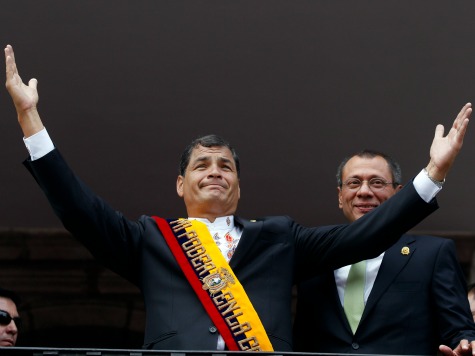
As Wikileaks’ Julian Assange marks a second year living in the Ecuadorian embassy in London decrying the alleged suppression of free press in the Anglo West, Ecuadorian President Rafael Correa plots even more potent initiatives to silence opposition media in his country.
Correa, who has already faced criticisms for silencing members of the press that choose to criticize his socialist government, proposed a constitutional amendment this week that would make the media a “public service” rather than a public industry. According to Infobae, the idea surfaced at a meeting of Alianza País, Correa’s political party.
“Why not make a constitutional amendment to establish that communications, and particularly information, are not merely private business but a public service that has to be guaranteed appropriately to society?” Correa asked his party. As the president and leader of the party, Correa’s decision could make the constitutional amendment part of the party platform and potentially bring all of Ecuador’s news media under Correa’s control. “That,” he concluded during his pitch, “would be to continue expanding our revolution.”
Correa, who had deep ties to the government of Venezuela under Hugo Chávez but has since diminished his support to socialist president Nicolás Maduro, has previously been criticized by international observers as stifling freedom of the press in response to criticism from newspapers and online media in the country.
In January, Correa seized the assets of Fundamedios, an NGO established to promote freedom of the press in the country. That move led to widespread criticism from human rights advocates, who considered it the first step in a more extensive action to silence opposition. “Since President Rafael Correa took office in 2007, sweeping changes in laws, government policies, and new and proposed regulations have turned Ecuador into one of the region’s most restrictive nations for the press,” the New York-based Committee to Protect Journalists said in response to the seizure.
In addition to public moves to silence the media, several investigative journalists in Ecuador investigating the Correa government reported receiving death threats either directly or through their family. Janet Hinostroza, a former television host in the country, told the Associated Press in December that she resigned after a string of threats came her way for criticizing the Correa government. “The president has viewed the press as the enemy from the moment he took office. He considers us his only enemy because there is no political opposition,” she said.
Correa also came under fire during the end of his second term for amending the rules of reelection nationally, leaving the door open for his reelection into 2017.

COMMENTS
Please let us know if you're having issues with commenting.